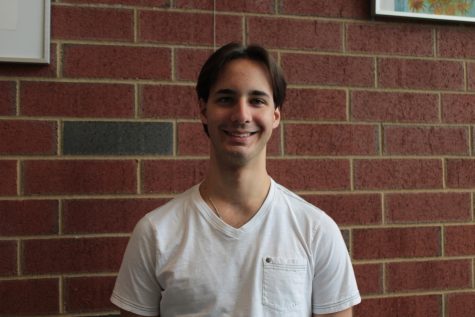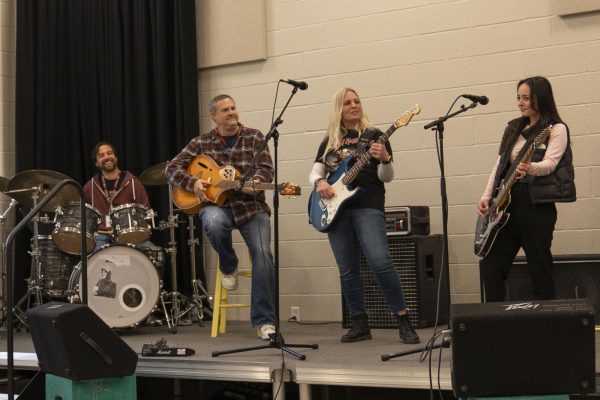There Are Fish In Our School!

Goldfish swim around their tank in the aquaponics greenhouse. These fish were brought to State High as part of the aquaponics program. “It’s a combination of aquaculture, which is farming fish for food, and hydroponics, which is growing plants in something other than soil,” Biology teacher Jack Lyke said.
They’re here, they’re swimming, and they’re not the State High Swim Team. There are two fish tanks in the greenhouse off of the B200 area along with some plants, surprisingly, also in tanks. They’re here as part of a science club known as Aquaponics, run by Biology teacher Jack Lyke.
“It’s a combination of aquaculture, which is farming fish for food, and hydroponics, which is growing plants in something other than soil,” Lyke said.
The greenhouse contains three sets of tanks. There are large, flat open tanks that have lettuce growing in them, and there are also two fish tanks. One contains blue nile tilapia, brought in from the country’s top breeder in Kentucky, and the other contains regular goldfish, just like what can be found in a neighbor’s fishpond. In fact, they predominantly come from local ponds, including some from Lyke’s wife’s pond. The tilapia, which were originally only a couple of inches long, will grow big enough to eat by the end of the school year. The members of aquaponics will get to enjoy the fruits of their labors in the form of lettuce and tilapia sandwiches from their own greenhouse.
However, it’s not all about food. The fish will eventually be eaten, but in the meantime, they’re earning their keep. All animals produce ammonia as a waste product. Bacteria, found naturally in the water, convert ammonia into nitrates, which are a source of nitrogen for the plants. Then, the nitrified water is pumped into the plant tanks and acts as a fertilizer. The plants get water and nutrients. They then filter the water and it is sent back to the fish. This cycle is almost completely finished; the only thing that needs to be added to the tanks is food for the fish, and occasionally some water to account for evaporation.
If students are interested in joining Aquaponics Club, they should contact Mr. Lyke. Aquaponics generally meets after school on Mondays and Wednesdays until 5:00 or 5:30 p.m. Additionally, starting in the second semester, there will be an aquaponics course offered for science credit. It will focus on sustainability, both locally and globally, and will probably include some face time with the fish.
“Stop by,” Lyke invited. “If anybody walks by the greenhouse and sees me in there, tap on the glass and come on in. I’ll give them a tour.”
Your donation will support the student journalists of State College Area High School. Your contribution will allow us to purchase equipment and cover our annual website hosting costs.





